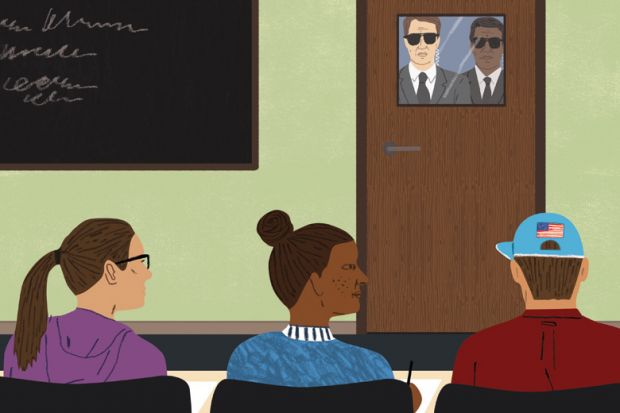The case of Paul Hamilton should give everyone involved in UK universities pause for thought. As reported in Times Higher Education, Paul is a US citizen who was awarded a PhD by the University of Birmingham. He was well known as a participant in Kingston University’s Shakespeare Seminar and was working on postdoctoral applications to the Wellcome and the Leverhulme trusts to continue his research at Kingston. This was until he was arrested at his home address in Stratford-upon-Avon and detained at Morton Hall Immigration Removal Centre in Lincolnshire for 10 days, before being released to leave the UK of his own volition.
Paul’s situation was the subject of extensive media interest, and it led to Roger Mullin, the Scottish National Party MP, asking in Parliament for an urgent statement from the Home Office. By way of reply, the leader of the House of Commons and the former secretary of state for justice, Chris Grayling, said: “Students are only ever going to be arrested if they are in the United Kingdom without a visa. We have rules. We may agree or disagree about them, but there is no excuse for anybody to break them.”
And there is the rub. Paul did not break any rules, and yet he was arrested. In fact, he was meticulous in following the rules. He was obeying the requirement for him to apply for leave to remain within 10 days of the expiry of his visa. This application cost him £650, and, as part of the process, he had purchased an open return flight to the US for $1,200 (£825), allowing him to leave the UK at short notice should his request fail.
The first time Paul had any indication that he had been refused leave to remain was when he was served a Home Office notice by the arresting officers on 17 January. The papers, dated 9 December, stated that he would be detained because “you do not have enough close ties (e.g. family or friends) to make it likely that you will stay in one place”.
What is at issue here is not whether a highly skilled humanities graduate should be granted leave to remain in the UK, nor whether those who are illegally in the country should be subject to arrest. Rather, it is the precedent that any graduate or student who does not have family local to their place of residence is liable to arrest by a Home Office flying squad and detainment as a “flight risk”. This, by definition, is the situation of almost every international student in the country.
Paul is perhaps fortunate in that, despite what the Home Office notice contends, he does have many friends in the UK, and they were able to escalate his cause through the national media to the House of Commons. How many international students will be in that position? How many times does this need to happen before international students take the hint and stop applying to UK universities? And what are UK universities prepared to do about it?
The risk is no longer that UK visa regulations may deter the best and brightest talent from studying and working here. It is that even if they persist in following all the rules and still want to participate in the cultural and economic life of this country, they could, without prior warning, be arrested, jailed and expelled.
Last October, I had the dubious pleasure of standing in the press zone at the back of the main hall at the Conservative Party Conference in Manchester, listening to an ominous speech by the home secretary, Theresa May. It was uncompromising in its attitude to immigration and to universities. She stated: “I don’t care what the university lobbyists say. The rules must be enforced.”
However, it would seem that with respect to international students, the rules now followed by the Home Office are not those of the rule of law. Rather, they are the rules of the political jungle, in which ambitious politicians with leadership pretensions play a tawdry game of one-upmanship against the more extreme fringes of their own party and the zealots of the UK Independence Party. This game makes no economic or educational sense, and will drive international applicants into the arms of US, Canadian and Australian universities.
Theresa May once warned Conservatives against being seen as the “nasty party”. But now she is seeking to prove who can truly be the nastiest party – and, in the process, cheapening the public discourse on immigration – so that the Conservative hierarchy can see off Ukip (and their own backbench MPs) in the debate over the UK’s membership of the European Union. This is not just a game of high political stakes: all international students are caught in the middle of a political strategy that can only abase British public life. After the arrest of Paul Hamilton, the question of visa policy can no longer be considered a theoretical problem for the ivory towers of academia. This stuff just got real.
Martin McQuillan is pro vice-chancellor for research at Kingston University.
Register to continue
Why register?
- Registration is free and only takes a moment
- Once registered, you can read 3 articles a month
- Sign up for our newsletter
Subscribe
Or subscribe for unlimited access to:
- Unlimited access to news, views, insights & reviews
- Digital editions
- Digital access to THE’s university and college rankings analysis
Already registered or a current subscriber?




